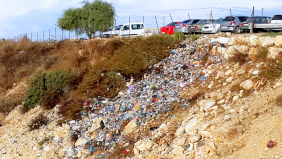Barta'a-Reihan, Tura-Shaked, Ya'bed-Dotan
06:05 A’anin checkpoint
The rain that fell throughout the area last night continues this morning and keeps many people home. Only about a quarter of the usual number arrived at the checkpoint. Before the separation fence was erected farmers would begin to sow and plant vegetables among the olive trees at the end of the harvest, to use the land and take advantage of the rains. But now, when the occupier doesn’t allow them to reach their lands every day, they can no longer raise vegetable for their own use. A resident of Araka, a Palestinian village southeast of A’anin, supports himself from temporary jobs he’s able to find in the seam zone. He has a crossing permit for the A’anin checkpoint but asks us, again, to help him obtain a crossing permit for Barta’a. Not only because he’ll be able to cross there for work more often than twice a week, but mainly because it costs him NIS 50 to go the 15 kilometers from Araka to the A’anin checkpoint (alone in a taxi because no one else travels that route), while the same distance to the Reihan checkpoint, in a jitney, is only NIS 10. That’s a huge difference for someone who earns only NIS 100/day (and only twice a week)! He’s not a young man; that’s the only work he’s been  able to find to barely make a living. Who’ll deal sympathetically with this case? Others complain (again) about S., the DCO representative (an officer?), who’s rude to them. Today people going through are registered on a cellphone, not a computer. Let’s hope the list doesn’t disappear – otherwise, everyone crossing this morning will, when they return this afternoon, be considered to have been in Israel illegally and be punished.
able to find to barely make a living. Who’ll deal sympathetically with this case? Others complain (again) about S., the DCO representative (an officer?), who’s rude to them. Today people going through are registered on a cellphone, not a computer. Let’s hope the list doesn’t disappear – otherwise, everyone crossing this morning will, when they return this afternoon, be considered to have been in Israel illegally and be punished.
06:55 Tura checkpoint
The soldiers arrived late; crossing begins only at 07:10. People have begun coming through, but not vehicles, because the metal barriers inside this little checkpoint that are operated electrically are stuck. They don’t rise. The principal of the Yabed school, who’s afraid he’ll be late to work, turns his car around and drives away, angry, always angry, to the distant Barta’a checkpoint. It was much easier to cross here before the checkpoint was crammed with a ridiculous number of installations and devices to control and limit movement through it. The strike of teachers in the West Bank will continue until this coming Sunday because their salaries  were delayed. So today we can’t enjoy watching the little children running happily through the checkpoint.
were delayed. So today we can’t enjoy watching the little children running happily through the checkpoint.
07:20 Yabed checkpoint
The Dothan valley landscape is so very beautiful. The air is clear, the clouds soften the sun’s rays. But there’s a checkpoint at the end of the lovely road; and soldiers whom we can’t see at the moment but can hear in the pillbox; and an armored D9 bulldozer, which the army has nicknamed “Dubi,” weighing 56 tons, with communications and firefighting equipment, a machine gun mount and 405 horsepower. And why is this monster always parked here? So if another earthen berm must be erected between the highway to Jenin and Yabed’s fields (so the residents won’t be able to use side roads) it can be done quickly.
and 405 horsepower. And why is this monster always parked here? So if another earthen berm must be erected between the highway to Jenin and Yabed’s fields (so the residents won’t be able to use side roads) it can be done quickly.
08:10 Barta’a checkpoint
On the way back from Yabed to the Barta’a checkpoint you can see a river of colorful garbage flowing down to the wadi below. A line of pickup trucks loaded with merchandise from the West Bank waits to be inspected and go through. Private cars that can’t cross to the seam zone park by the roadside before the checkpoint, beyond the crowded parking lots.
